
Related
Topics
Guests
- Rashid KhalidiEdward Said Professor of Arab Studies at Columbia University. He is the author of several books, including his latest, Brokers of Deceit: How the U.S. Has Undermined Peace in the Middle East.
- Eran Efratiformer Israeli combat soldier turned anti-occupation activist and investigative researcher.
In the aftermath of Tuesday’s attack that killed five Israeli civilians in a Jerusalem synagogue, Israeli Prime Minister Benjamin Netanyahu accused Palestinian President Mahmoud Abbas of inciting violence in the city and said the killings were part of a “battle over Jerusalem.” Abbas has condemned the attack, which came after weeks of unrest fueled by a dispute over Jerusalem’s holiest site, known to Muslims as the Noble Sanctuary and known to Jews as the Temple Mount, as well as the continued expansion of Israeli settlements. We discuss the worsening tensions in Israel and the Occupied Territories with two guests: Rashid Khalidi, Edward Said Professor of Arab Studies at Columbia University and author of several books, and Eran Efrati, a former Israeli combat soldier turned anti-occupation activist and investigative researcher.
Transcript
JUAN GONZÁLEZ: We’re continuing our coverage of the crisis in Jerusalem, where five Israelis died Tuesday when a pair of Palestinians armed with meat cleavers and a gun stormed a synagogue during morning prayers. It was the deadliest attack on Israeli civilians in more than three years and the worst in Jerusalem since 2008.
AMY GOODMAN: We’re joined now by two guests here in New York. Rashid Khalidi is the Edward Said Professor of Arab Studies at Columbia University. He’s the author of a number of books, including his latest, Brokers of Deceit: How the U.S. Has Undermined Peace in the Middle East.
Eran Efrati is also with us, a former Israeli combat soldier turned occupation—anti-occupation activist and investigative researcher. His family has lived in Jerusalem for seven generations.
Let’s start with Professor Khalidi. Your response to what has taken place, not only yesterday, the killing of the four Israeli Jews and one Druze at the synagogue, but in the lead-up to that, as well?
RASHID KHALIDI: Well, tensions have been growing since the summer, and Jerusalem is the flashpoint. When, on top of the pressure that Palestinians are all under because of this occupation that’s now in its fifth decade, you have the issue of the Haram al-Sharif, the Al-Aqsa Mosque, and you have calls by senior ministers in the Israeli government, like Naftali Bennett, to completely change the status quo, to in effect take over a Muslim holy place that’s been the center of devotion for 1,400 years and, essentially, do to it what was done to the mosque in Hebron—turn it into a Jewish holy place where Muslims are occasionally allowed—you are throwing fuel on the fire. And so, ever since the last couple of months, there’s just been an escalation in tension all over the city.
You have increased settlement activity that just is penetrating neighborhood after neighborhood. Arab neighborhoods that have never seen armed settlers, with a heavy military and police presence to guard them, are now slowly, but surely, being colonized one by one. And so, you’re basically turning up the heat on a very, very hot situation, and that’s been going on now for many months.
JUAN GONZÁLEZ: And given the inability of the leaders to be able to negotiate a settlement to the ongoing occupation, do you think that there’s a possibility that we’re under the brink of a Third Intifada, with the young people just saying, “Hey, our leaders can’t deliver anything”?
RASHID KHALIDI: Well, I think that what Amira Hass earlier said is correct. In Jerusalem, in particular, there’s an absence of leadership, but there’s an absence of leadership for the Palestinians as a whole. And that has been, I think, signaled over the Gaza crisis. It’s been signaled over the inability of the Palestinians to actually put together a reconciliation, a unity government, and to define a strategy.
I mean, Israel has a clear strategy. It is that they will negotiate forever, but they will not give up control of the Occupied Territories. The most important statement made by an Israeli politician was made by Netanyahu this summer. He said, “We will keep permanent, perpetual security control of these territories.” So he’s basically said, “No state, no sovereignty, no independence. You can talk as long as you want. I will meet with you. But you will never get an end to occupation.”
Well, that’s—something has to give here. I don’t think—I agree with Amira: I think that people in the West Bank are afraid. They’re both afraid of Israeli retaliation and they’re afraid of the security cooperation between the Palestinian Authority, which helps the Israelis to hold them down, and Israel. So, I’m not sure that that’s where we’re going. We may be going to more—sadly, to more horrible random acts of violence and more eruptions of kids, without leadership, in various parts of the West Bank, perhaps, and Jerusalem.
AMY GOODMAN: Is there something shifting here, from an Israeli-Palestinian conflict to a Israeli, perhaps, Jewish-Muslim conflict, which certainly involves many more people than just in that area?
RASHID KHALIDI: Well, I mean, this is certainly grist for the mill of people who want to turn it into a religious conflict. There are certainly people on the Israeli side and people on the Palestinian side, but in the broader Arab and Muslim world. I mean, this group in Sinai, which announced its adherence to the Islamic State in Syria and Iraq, is called Ansar Beit al-Maqdis, a support—
AMY GOODMAN: The Egyptians.
RASHID KHALIDI: The Egyptian Sinai group that announced its adherence to the Islamic State off in Mosul and Baghdad, al-Baghdadi’s group, is called Ansar Beit al-Maqdis, supporters of Jerusalem. This is a card that these people will play. So, yes, this is not just tinder in the Palestinian-Israeli arena, religious tinder; this is religious tinder all over the region. I don’t know what—I’m not suggesting that’s necessarily going to—something is necessarily going to happen, but the Israeli government is playing with fire. They have a senior minister—Naftali Bennett is one of the three most important people in the Israeli Cabinet. He is making incendiary statements. His party and Lieberman’s party are saying and doing things that Palestinians watch. They know who these people are. They know how important they are in Israeli politics. They know the kind of support they have. And people are quite afraid, I think.
JUAN GONZÁLEZ: And Eran Efrati, as a former soldier now turned anti-occupation activist, your reaction as you’re seeing this latest flare-up over this terrible attack yesterday?
ERAN EFRATI: All right. So I think when we’re really trying to understand what happened in Jerusalem the last few months, we’ll need to understand it in a broader context—the broader context of maybe 70 years of ethnic cleansing all over Palestine, but definitely in the last 40 years in East Jerusalem and around specifically the holy sites, trying to bring more and more Jews into this area instead of Palestinians and determine a new history, if you want, a new history when you cannot divide Jerusalem, because Jews were always there in the Old City and around these holy sites. So, from this situation, the angle is to make Palestinians leave Jerusalem. And we’re trying to oppress them so much. And this our goal—when I was in the army—in the police in Jerusalem, the goal is to make people’s life miserable. When we were in the army, they’re trying to tell us that to do that, we’re doing it for the fact that they will not act in terror attacks. So, we need to make their life miserable, so they will be afraid all the time, and they will not have time to plan terror attacks. It’s, of course, ridiculous. The end goal in the end to make them want to leave also made them want to do crazy things, like attacks on Jews and on Israelis.
The second context I will talk about—I think it’s important to talk about—is the last 10 years. Since the last—since the Second Intifada, the end of the Second Intifada, that was very bloody for both sides, the Palestinian society decided to act in nonviolent acts, trying to go to the U.N., like Amira Hass has mentioned, going to the U.N. promoting BDS—boycott, divestment and sanction movement—on Israel. All of that was countered in a very, very harsh oppression by Israel. People in Israel, officials in Israel are calling them terrorists. If you’re going to the U.N., you’re a political terrorist. If you’re promoting BDS, you’re an economic terrorist. People are arrested for that. You know, institute like [inaudible] Institute, a right-wing institute in Jerusalem, is calling the Parliament, telling them that it will help them expose BDS activists to stop them and arrest them and destroy their homes. You know, when we’re—
AMY GOODMAN: BDS being boycott, divestment and sanctions movement.
ERAN EFRATI: Right, Amy. When we’re reacting to nonviolence in such a violent way and oppression, and we explain to the Palestinians, “There is no legit way to resist the occupation, there’s no legal way to resist us,” it will always end up with violence. Oppression with violence will counter resistance with violence. And in the last four months, Jerusalem is burning. I’m there. I’m from there. I’m a seventh generation in Jerusalem, and I was there in the last few months. Jerusalem is burning since the beginning of the summer, and of course since the killing of Mohammed Abu Khdeir, that, by the way, one of his killers that burned him to death in July was from Har Nof neighborhood.
So, the tension is always there. But the media was not always there, and the attention was not always there. For 40 years, East Jerusalem is in this situation, but nobody seemed to be noticing, because in the last 10 years, for Israelis, since the end of the Second Intifada, it was quiet years. For us, it was peaceful years, because we weren’t living in fear. But Palestinians never had those quiet years. They always lived in fear. They didn’t stop being attacked by the police, by the army—and now, since the summer, by civilians, by mobs on the streets going there and looking to lynch people. And they do, like Mohammed Abu Khdeir, like two days ago when they found in East Jerusalem a bus driver, a Palestinian bus driver, a father to two girls, hanged in the middle of his bus after a violent attack on him, lynching him and hanging him up in the middle of the bus. But it doesn’t seem like nobody is talking about it.
AMY GOODMAN: Wait, explain that, because it was said that he committed suicide.
ERAN EFRATI: Yes, the police came out—exactly like in the Mohammed Abu Khdeir story, by the way, when they came out and said that his family found out that he’s—their son is gay, and this is why they killed him, some homophobic and racism combined together. And, of course, in the end, they have to admit that he was actually lynched to death. The same here. The police came out immediately and said that he committed suicide. His picture, by the way, is going around online, and you can see the violent signs on his body and the rope around his neck. It’s completely crazy, but nobody is talking about it. I’m hearing Barack Obama coming out and condemning this story. I think it’s important to understand that he’s—it’s important to condemn violence against civilians, but where was he when violence against Palestinian civilians are happening every day?
JUAN GONZÁLEZ: I wanted to ask you about the role of Americans, here, financing and helping to support settlement expansion in Israel. The impact that that has?
ERAN EFRATI: Definitely, so much money is being transferred mostly from the evangelicals, but not only. Weapon companies that fuel this government, lobbyists of weapon companies that fuel this government and a lot of right-wing Zionist movements in this country is actually being fueled to the settlement movement in East Jerusalem, all over the West Bank, and to the right-wing parties in Israel. In a lot of ways, the U.S. control completely the political situation in Israel. Like Professor Khalidi just mentioned, the political atmosphere is extremely violent and fascist. And the United States not only enabled that, it’s backing it up with money and with support.
AMY GOODMAN: I want to turn to comments President Obama made following the attacks on the synagogue yesterday.
PRESIDENT BARACK OBAMA: Tragically, this is not the first loss of life that we have seen in recent months. Too many Israelis have died. Too many Palestinians have died. And at this difficult time, I think it’s important for both Palestinians and Israelis to try to work together to lower tensions and to reject violence. The murderers for today’s outrageous acts represent the kind of extremism that threatens to bring all of the Middle East into the kind of spiral from which it’s very difficult to emerge, and we know how this violence can get worse over time. But we have to remind ourselves that the majority of Palestinians and Israelis overwhelmingly want peace and to be able to raise their families knowing they’re safe and secure. The United States wants to work with all parties involved to make that a reality and to isolate the kinds of extremists that are bringing about this terrible carnage.
AMY GOODMAN: That’s President Obama speaking yesterday in response to the attacks on the Jerusalem synagogue. Professor Khalidi, your response and how you feel the U.S. should respond?
RASHID KHALIDI: Well, the United States is precisely the enabler of all of this. The United States, by its diplomatic support, prevents any real pressure on Israel to stop it from occupation, settlement and repression.
AMY GOODMAN: And the tension reportedly between Netanyahu and Obama?
RASHID KHALIDI: I mean, that and five cents won’t get you a cup of coffee. The president can vent and have his acolytes and his flacks and his hacks say nasty things about the Israeli prime minister. As long as American money is going to support the repression of Palestinians, as long as 501(c)(3) supposedly “charitable” organizations in this country are not stopped by the Justice Department, are not stopped by the Treasury, from funneling tens and hundreds of millions of dollars to settlement activities and to the repression of Palestinians, what the president says is meaningless. This is an American-Israeli enterprise, in fact. The money is largely from the United States. The weapons are from the United States. We are implicated.
And we are running interference for Israel. Whenever anybody tries to do anything—British Parliament, the Spanish Parliament, the Irish Parliament, the Swedish government—the United States objects. Whenever anybody tries to do anything diplomatically or in a nonviolent manner, such as boycott, divestment and sanctions, we’re told that these are anti-Semitic actions. So, presumably, the Palestinians are supposed to lie down and let the bulldozers and the settlement enterprise and the repression run over them and go back to negotiations, which Netanyahu has already told us can never lead to an end to occupation. That’s the doing of the United States, to a very large extent, I’m afraid.
AMY GOODMAN: Your family background, Professor Khalidi? I mentioned that Eran’s family goes back, what, seven generations in Jerusalem. Yours?
RASHID KHALIDI: Our family—my family is a Jerusalem family. My uncle was the last elected Arab mayor of Jerusalem. He was elected in 1934. He was deported to the Seychelles by the British in 1937, but he served as mayor for three years before British colonialism dealt with him. So, we’re an old Jerusalem family. I have cousins living there, and I’ve talked to them. It’s scary. What Amira reported is true. There is an enormous amount of fear. People who have families, people who have kids, are really worried about what will happen to their kids. They’re worried about what will—you know, my cousin has a garden. Israeli undercover agents leap over the wall and chase people through their garden. It’s terrifying. And there’s nothing you can do about it. Palestinians have no share in the governance of the city. It is ruled by others, for others, for a project that is designed to dispossess them and make them into third-class citizens and, ultimately, if possible, get as many of them out. They’re 38 percent of the population of Jerusalem, Palestinian Arabs, and yet they are treated as if they have absolutely no rights.
JUAN GONZÁLEZ: And given the worldwide condemnation of the occupation and the continuing refusal of the Israeli government to negotiate some kind of just settlement, what do you see in terms of potential hope for any kind of progress in the conflict?
RASHID KHALIDI: Well, one thing that is happening is that in this country there is an awakening among younger people, the kind of people who watch this show or listen to this show, people who do not consume the mainstream media, people on campuses. There is an enormous change in public opinion below the level of the mainstream media. The second thing is, in Europe, there is an enormous shift. Four major European countries have had parliaments or governments actually take a stand. Now, that has yet to be translated into effective pressure to stop these acts of oppression, but we’re getting there.
AMY GOODMAN: Sweden just recognized Palestine.
RASHID KHALIDI: Sweden has recognized Palestine. The Spanish Parliament voted yesterday. The Irish Parliament has voted, and the British Parliament has voted. So we have four of the most important countries in the world, have come around or are beginning to come around in an official fashion on this. This is only going to increase. Everybody in Europe knows what’s going on. What the American media doesn’t tell the Americans, the European media does tell Europeans. And so, I think that you’re going to see increasing pressure on Israel, at least from Europe and the rest of the world. The problem is here. The problem is in this country.
AMY GOODMAN: Finally, Netanyahu saying that the occupation will remain forever because the borders are indefensible, your response?
RASHID KHALIDI: Well, he claimed that what has happened with the erection of this supposed Islamic caliphate shows why Israel has to maintain permanent security control over the Jordan River Valley and the entirety of the Occupied Territories. I mean, he has been finding excuses for the longest time why Israel has to continue settling, has to continue occupying, has to continue oppressing. It’s a pretty transparent maneuver. Obviously, you do not control a region by oppressing the people and turning them into your enemies, which is what Israel has been doing for 47 years.
AMY GOODMAN: We’re going to have to leave it there. We thank you both very much for being with us. Rashid Khalidi is the Edward Said Professor of Arab Studies at Columbia University, author of a number of books, including, most recently, Brokers of Deceit: How the U.S. Has Undermined Peace in the Middle East. And Eran Efrati is former Israeli combat soldier turned anti-occupation activist and investigative researcher.
This is Democracy Now! When we come back, a very close vote in the Senate to defeat the Keystone XL pipeline. Stay with us.

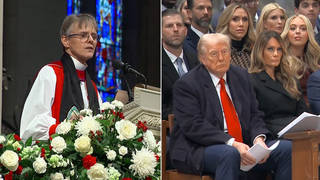
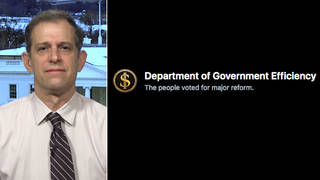
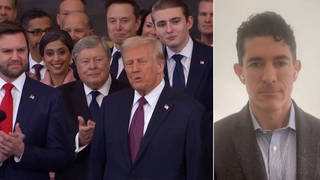
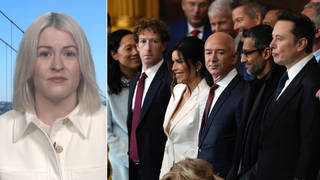






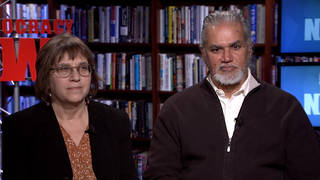
Media Options